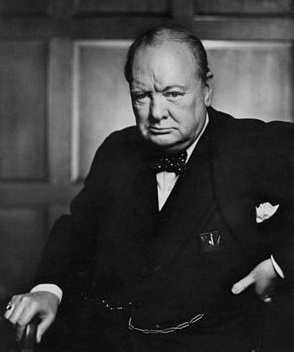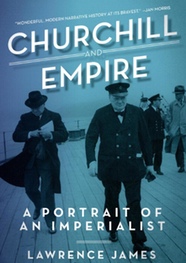Our Winston Churchill Problem

 Next year will be the fiftieth
anniversary of Churchill's death. The British have become madly
obsessive about anniversaries and 2015 will be a busy year what with
Magna Carta (1215), Waterloo (1815) and Agincourt (1415). Of one thing
we can be sure, the celebrations will throw up a highly selective,
sentimental and narrowly focused version of the men and events to
which we can relate. The First World War junketings, which began over
a year ago, are all about the Western Front and explanations as to
why the war started and who, if anyone, was to blame. Next to nothing
has been, nor will be heard about the pivotal role of the Royal Navy
or the aggressive acquisitiveness of all the participating powers and
their lust for Empire.
Next year will be the fiftieth
anniversary of Churchill's death. The British have become madly
obsessive about anniversaries and 2015 will be a busy year what with
Magna Carta (1215), Waterloo (1815) and Agincourt (1415). Of one thing
we can be sure, the celebrations will throw up a highly selective,
sentimental and narrowly focused version of the men and events to
which we can relate. The First World War junketings, which began over
a year ago, are all about the Western Front and explanations as to
why the war started and who, if anyone, was to blame. Next to nothing
has been, nor will be heard about the pivotal role of the Royal Navy
or the aggressive acquisitiveness of all the participating powers and
their lust for Empire.
So, how do we celebrate Churchill? The safest way will be to concentrate on him as the savior of Britain whose willpower and rhetoric inspired the nation during the years of perilous isolation between May 1940 and June 1941. To commemorate this is right and proper, and will doubtless prompt some not undeserved national self-congratulation as well as plenty of bleating about the decline of the British national character, a form of indulgence now over a hundred years old and still flourishing. Here we are in turbulent waters, for Churchill epitomized a national greatness and stature that was based on a mighty navy and a vast empire of dominions and colonies which provided large contingents of fighting men and women in two world wars. Churchill's Britain was always an imperial nation with global power and, he believed, that was destined to bring enlightenment and prosperity to the rest of the world. He was a child of late-Victorian confidence when politicians (Teddy Roosevelt was one) could proudly declare that the Anglo-Saxon race was ordained to rule the world in the name of civilization.
Churchill was also a passionate democrat who believed in individualism and personal freedom and who had swallowed contemporary notions of racial hierarchies and social Darwinism. His views were not cast iron: he thought peoples who had lagged behind in the struggle to master their environments could do so eventually and with help from outsiders. How did a man with this creed square it with imperialism which depended upon coercion? Churchill never resolved this conundrum. He admired the Somalis fighting for their barren homeland against the British in the 1900s, sacked General Dyer for shooting down demonstrators in Amritsar in 1919 and wept when he heard how a handful of brutal officials and policemen were cruelly maltreating Mau Mau prisoners in 1954. His career was marked by an internal struggle between his love of freedom and the fact that the British Empire denied it, even though its overall intentions were benevolent and humane.
As a domestic politician, Churchill was a patrician Whig who upheld the ideal of noblesse oblige (he was a duke's grandson) by which enlightened men of his caste had a public duty to govern justly, treat the weak and the poor with kindness and inspire and guide public works. As a young man he denounced the growing influence of money and the men whose lives were devoted to making it for themselves. As an old man he favored the redistribution of wealth in Britain. Churchill had no time for political straitjackets imposed by parties; he thought for himself.
Most contentious of all, Churchill wanted the United States (he had an American mother) and the British Empire to work in harness for the benefit of the world. His is the architect of what during and after the Second World War was the “special relationship” and he worked tirelessly to promote it. The problem was America was viscerally hostile to empires and wanted their dissolution. Wartime tensions over this issue continued and deepened after 1945: Put simply the British and French empires were a Soviet and Chinese asset during the Cold War when the two Communist powers vilified the West as oppressive. The communist powers and not America were the natural allies of Africans and Asians seeking self government.
It was a big lie but an effective one. America nudged and, when necessary, shoved Britain into withdrawing from its colonies. Eisenhower badgered Churchill on this issue, but was rebuffed on the grounds that Britain's colonies were unready for independence. Whether they were remains an unanswered and unanswerable question. Certainly, the histories of nations like the Sudan, Zimbabwe. Uganda and Burma suggest that Churchill may have been right in his judgement that self government was premature. Not that this mattered unduly, for he was overridden not only by the White House, but by his own colleagues. By 1965, when Churchill died, the red bits had vanished from the map. The “special relationship”’has lingered on and British cynics wonder whether it was and is a relationship between master and servant. Squire Bush was the master and Tony Blair was his sycophantic and obedient lackey. This is how it seems to millions in Britain.
These are contentious matters. A former world superpower that cannot quite shake off its pretensions to global influence will next year be remembering the man from the age when the British Empire spanned the world and Britannia ruled the waves. Will the glories he held dear be celebrated? Or, and this is more likely, will they be discreetly overlooked.